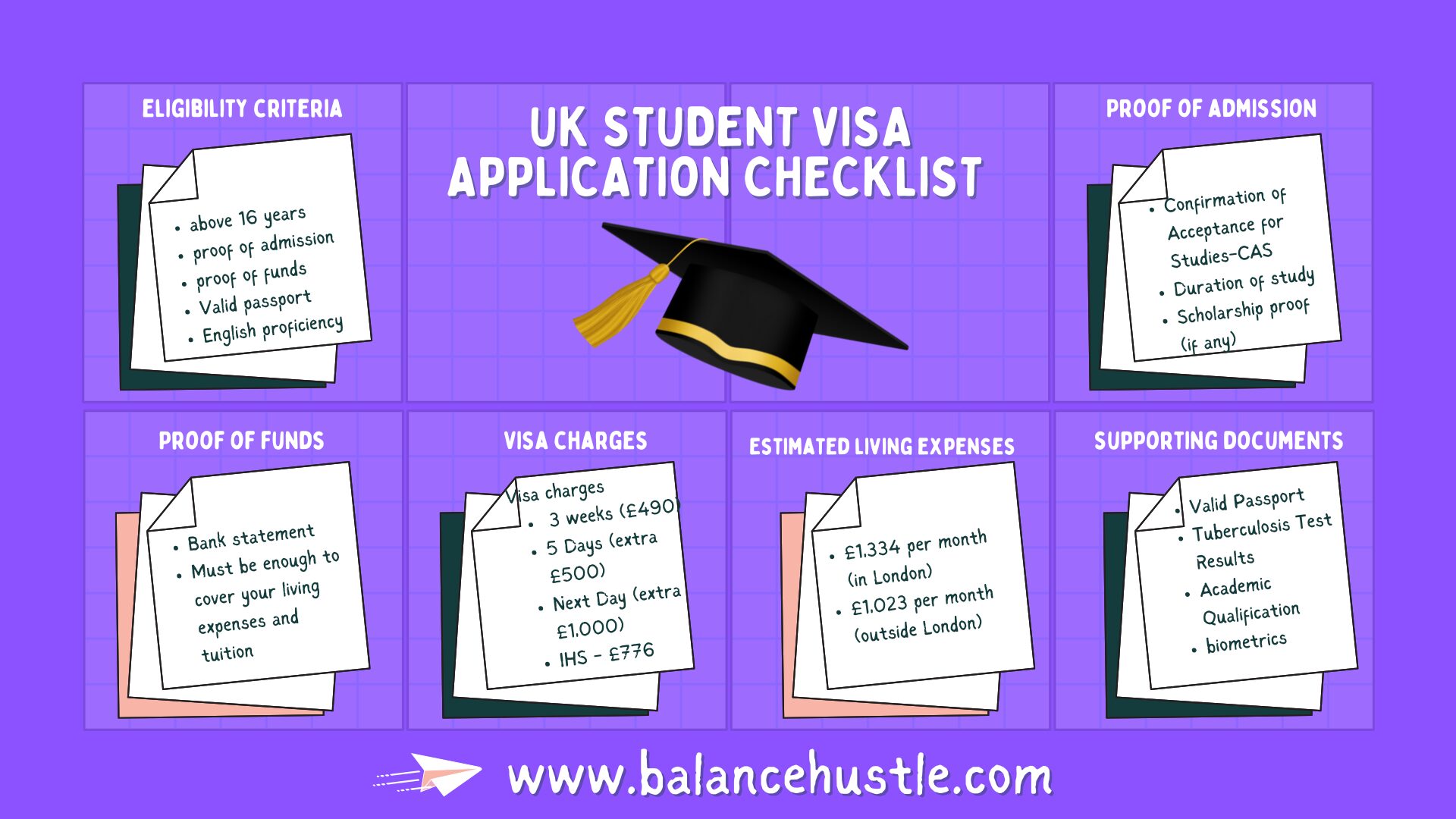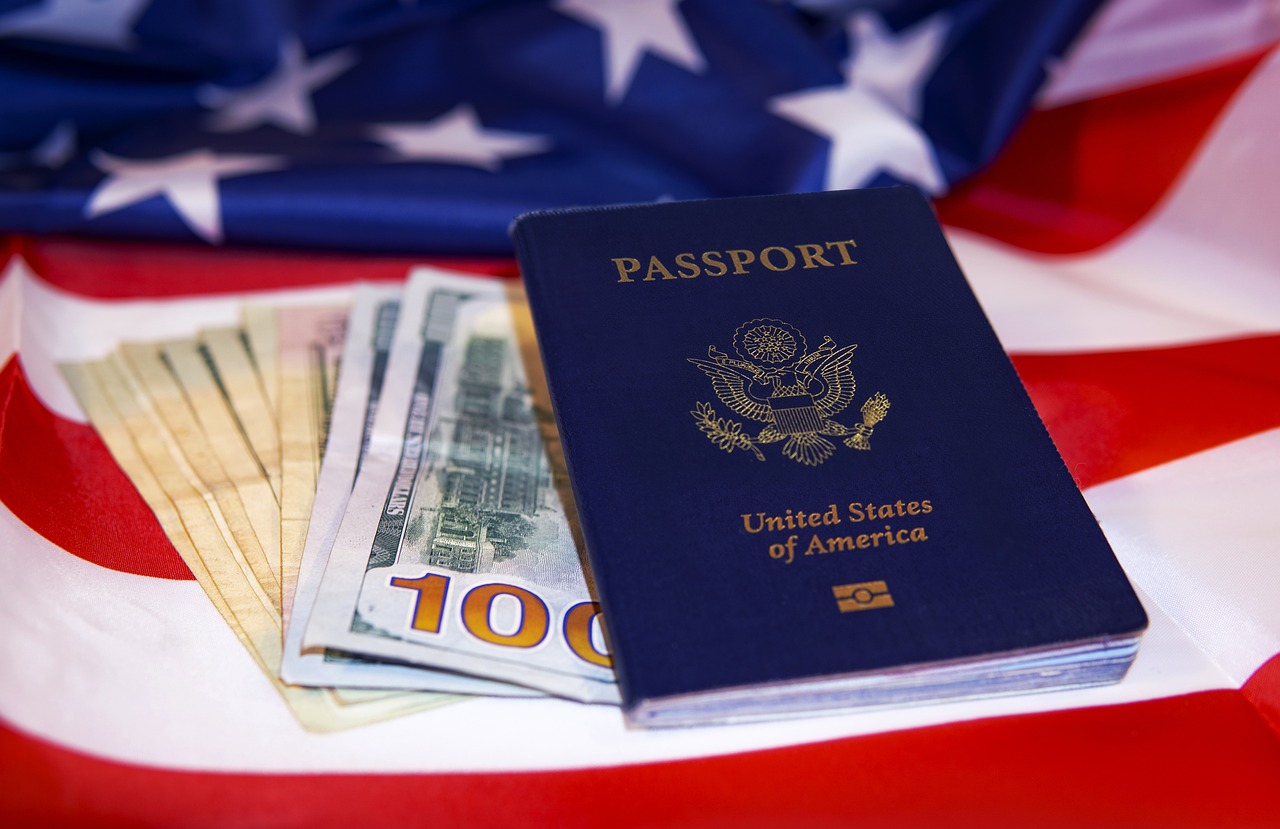The United Kingdom hosts some of the world’s top universities, thousands of international students from around the world and offers a dynamic, multicultural environment perfect for students of all backgrounds.
While studying in the UK is rewarding, obtaining the UK visa from Africa can easily becoming a difficult venture especially if you don’t understand all the different steps involved when applying for it. If you are considering the UK as your study destination, then this article is right for you.
In this guide, we will answer common questions like:
- What documents are required for a UK student visa?
- What are the steps for applying for the student visa?
- How long will it take to get approved?
- What is the UK student visa application fee?
These are common questions, and this guide will clearly and confidently walk you through each step so you can focus on the most important thing—starting your studies in one of the world’s most vibrant education hubs.
By following this guide, you will be well-prepared to get your student visa for the UK studies without worry.
Contents
- 1 What You Need to Know about UK Student Visa in 2025
- 2 Pre-Visa Application Requirements
- 3 Step-by-Step Student Visa Application Process
- 4 Preparing to Enter the UK on Your Student Visa
- 5 UK Student Visa Frequently Asked Questions (FAQs)
- 5.1 When should I apply for my student visa?
- 5.2 How long does a UK student visa take to process?
- 5.3 How can I track my visa application?
- 5.4 What can delay my visa application?
- 5.5 How can I prevent delays?
- 5.6 What if additional documents are requested?
- 5.7 Who should I contact for urgent issues?
- 5.8 What if my application is refused?
- 5.9 When can I travel to the UK?
- 5.10 Taking the Next Step
What You Need to Know about UK Student Visa in 2025
What is a UK Student Visa?
A UK student visa allows international students entry to the UK and to live and study in the United Kingdom for the duration of their studies. This visa is important for anyone planning to enroll in a full-time course in any UK university that lasts longer than six months.
Previously known as the Tier 4 (General) Student Visa, the student visa permits students to engage in studies, certain work opportunities, and in some cases, bring dependents.
Depending on the duration and type of course, there are two main visa options:
- Student Visa: For students taking courses longer than six months.
- Short-term Study Visa: For those studying courses of up to six months or short English language programs.
Who Needs a Student Visa?
Most international students from outside the UK or Ireland will need a UK student visa. However, citizens of certain countries, such as those in the European Economic Area (EEA) and Switzerland, may have different visa requirements or exemptions. If you’re unsure, use the UK government’s visa eligibility checker to clarify whether you will need a visa or not.
Pre-Visa Application Requirements
The first step to having a hassle-free UK student visa approval is thorough preparation. This is the part most students are not aware of and often pay 3rd party agencies to assist them.
By gathering all required documents and making sure you meet each criterion, you can save yourself some time and minimize the chances of application delays.
In this section, we will list all the documents and other important requirements that you will need for your visa application process.
UK Student Visa Required Documents

To apply for a UK student visa, you wll need several important documents. Here’s a checklist to get you started:
- CAS (Confirmation of Acceptance for Studies): Once you have been offered admission in a UK university, the university will issue you aCAS number. This number verifies that you have been accepted into a course. You will need this number to begin your application.
- Valid Passport or Travel Document: This is the passport from your home country or any document that certified your nationality. This should be valid for the duration of your visa application. It is usually advisable to have at least 2 years of validity on your passport when applying for a visa.
- Proof of Funds: Most students from Africa will need to show that they have enough funds to pay their tuition fees and cover your living expenses. See the next section for details on the proof of funds requirement.
- Proof of English Proficiency: You will need to prove knowledge of the English language when applying for a student visa. We will discuss this extensively in a subsequent section.
- Academic Qualifications: Some courses require you to submit academic transcripts or certificates. Verify which document will be required from your university.
- Tuberculosis Test Results (if applicable): Students from specific countries (like Nigeria ) are required to take a TB test.
Tip: Keep these documents organized and ready to upload when you begin your online application.
Student Visa Proof of Funds Requirement

The UK government requires students to demonstrate that they have enough funds to support themselves throughout their duration of study. Based on current data, here’s what you should know:
- Living Expenses: If studying in London, you will need £1,334 per month, and £1,023 per month if studying outside of London. The total amount in your proof of fund should be enough to cover the duration of your course or up to nine(9) months, whichever is shorter.
- Tuition Fees: You will also need to show that you have enough funds to pay for at least the first year of tuition or the entire duration of your course if shorter. The amount will typically be shown on your CAS document.
There are a few exceptions to this payment though. For example, you don’t have to show proof of funds for tuition fees if you will be studying under a full scholarship but you will need to show proof of your scholarship. Also, if you will be staying in the university residential apartment, you will only need to pay for this apartment fee.
Your financial documents, such as bank statements or official letters from sponsors for the proof of funds should be dated within 31 days of your visa application.
Language Requirements
At the time of your student visa application, the UK government requires that you prove your knowledge of English. This is usually done by showing an English test score from one of these approved testing providers:
After taking your test you will be issued a reference number from your testing provider, this is what you will submit during your visa application.
There are few exemptions to English language proficiency. For example, citizens of certain countries are not required to show English language proof. To see if you or your country are exempted from this, simply check the UK government page on knowledge of English.
READ ALSO: How Much Does It Cost to Study in the UK?
Step-by-Step Student Visa Application Process
After gathering your documents and completing all pre-application preparations, the next step is to apply for your student visa.
Follow these steps to apply for your Student visa.
#1: Apply Online
The UK student visa application process is seamless and starts online from the GOV.UK visa application portal. Here’s a breakdown of what to expect:
- Register and Complete the Form: Set up an account, then complete each section of the form, entering details about your course, personal information, and CAS number.
- Upload Your Documents: Follow the instructions to upload your supporting documents. Double-check each upload for clarity and accuracy.
- Submit Your Application: Once your documents are uploaded, you’ll pay your visa fees (more on this in the next step) and apply.
Tip: Save copies of everything you submit online for your records.
#2: Pay the Visa and IHS Fees
The visa application includes:
- Visa Fee: The visa fee for a student visa is currently £490
- Immigration Health Surcharge (IHS): If you are staying beyond six (6) months in the UK, you will need to pay for the IHS. The fee is part of the NHS and allows you to use the UK’s National Health Service for free. For the student visa, the IHS amount is £776 for a full year and you will need to pay for the duration of your stay. For example, on a 2-year student visa, you will need to pay £1,552.
Be prepared for these costs at the time of submission, as both fees are required to process your application.
Some exceptions to know:
- Scholarship: if you are on a full scholarship, these fees might already be covered by your scholarship provider. Be sure to confirm if it is covered or not before your visa application
- European students: Students from the EU, Switzerland, Norway, Iceland, or Liechtenstein may be eligible for a fund refund after paying for the IHS. Check the UK government website on how to process your refund.
#3: Book Your Biometrics Appointment
Once you have submitted your application, you wil be required to book a biometrics appointment at a visa application center. This is part of the process of identity verification. You can find a visa application center from your location on the UK government website. During this appointment, you will submit your:
- Fingerprint Scans and Photos: This biometric data is necessary for visa issuance.
- Important Documents (if required): Depending on your country, you may need to submit physical copies of your documents.
Bring your passport and appointment confirmation with you to the center, and try to arrive early to avoid delays.
#4: Submit Your Supporting Documents
If you are required to submit physical documents, make sure they’ are organized and in good condition. Avoid staples or damaged pages, as these can delay processing. After your biometrics appointment, you may also have the option to submit additional documents online—double-check to ensure nothing is missing.
#5 Wait for Your Visa Decision
After your visa application, several factors might cause unexpected delays including:
- Processing Time
- Request for additional processing time
- Interview
If your application is delayed or you are asked to provide additional documents, respond promptly and provide clear copies. Common requests include clarifications on financial documents or verification of your CAS information. Proactive communication will prevent unnecessary delays.

Preparing to Enter the UK on Your Student Visa
What to Do Once Your Visa is Approved
If your visa application isvapproved, your passport will be returned with a vignette (visa sticker) for entry to the UK. Follow these steps for a smooth start to your journey:
- Confirm Your Travel Plans: Book flights and accommodation if you haven’t already done.
- Keep Key Documents Accessible: Carry your passport, CAS, visa confirmation, and proof of funds in your hand luggage for easy access.
READ ALSO: Preparing for Uni in the UK: A Packing List for International Students
Upon arrival, UK Border Control may ask to see documents like your CAS, proof of funds, or acceptance letter. Make sure you are prepared and know where everything is in your hand bag.
Student Rights and Responsibilities
As a UK student visa holder, you are allowed to work up to 20 hours per week during term time and full-time during holidays. Follow your visa conditions to ensure a positive and uninterrupted experience.
UK Student Visa Frequently Asked Questions (FAQs)
When should I apply for my student visa?
For a smooth visa application experience, it is advisable to apply for your student visa at least six months before your course start or as soon as your received confirmation of admission from your university. For peak period (like July – September) when there might high volume of visa application to process, you might consider using the priority service which offers a much faster processing time at additional cost.
How long does a UK student visa take to process?
Standard UK’s visa processing takes 3 weeks from your biometrics appointment. You have three options:
- Standard service: 3 weeks (£490)
- Priority service: 5 working days (extra £500)
- Super priority service: Next working day (extra £1,000)
Tip: Processing times start from biometrics, not application submission.
How can I track my visa application?
Two main tracking methods:
- Online Portal:
- Use your GWF number
- Log into the UKVI website
- Check status updates
- Email Updates:
- Application received confirmation
- Biometrics processing
- Document requests
- Decision notifications
What can delay my visa application?
Common reasons why your visa application might be delayed include:
- Documentation Issues:
- Incomplete financial evidence
- Missing English test scores
- Incorrect CAS details
- Unclear supporting documents
- Additional Checks:
- Background verification
- Financial source verification
- Academic qualification checks
- Sponsor checks
How can I prevent delays?
You can prevent delay by completing this pre-application Checklist:
- Double-check all documents
- Verify financial documents meet the 28-day rule
- Confirm CAS information accuracy
- Apply outside peak season
What if additional documents are requested?
If additional documents are required, follow these steps:
- Response Timeline:
- Make sure you respond within 10 working days
- Submit clear, legible copies of the requested document
- Keep submission receipts
- Include a cover letter explaining submissions
- Reference your GWF number
Who should I contact for urgent issues?
Contact options in order of priority:
- UKVI Contact Center:
- Paid inquiry service
- 24-hour response time
- Multiple language support
- Track existing applications
- Your University Support:
- International office
- Compliance team
- Course administrators
- Visa advisers
- Visa Application Center:
- Document submissions
- Status updates
- Technical support
- Appointment issues
What if my application is refused?
If your visa application is refused, please take the following available options:
- Immediate Actions:
- Read the refusal notice carefully
- Contact the university immediately
- Check appeal rights
- Secure document copies
- Next Steps:
- Administrative review (if eligible)
- New application with corrections
- Course deferral request
- IHS payment refund
When can I travel to the UK?
Entry timing rules:
- For Short Courses (6-month visa):
- Arrive up to 1 week before start
- Must enter during visa validity
- Plan BRP collection
- For Longer Courses:
- Arrive up to 1 month before start
- Entry within vignette dates
- Allow time for settling in
- Complete registration procedures
Taking the Next Step
Applying for a UK student visa doesn’t have to be overwhelming. With the right steps and preparation, you will be ready to start your journey to the UK with confidence. Remember, this guide is here to support you from start to finish—revisit it anytime you need clarity or reassurance. For more detailed information, be sure to consult the official GOV.UK website or contact your university’s admissions office.
Last updated: 16 November 2024